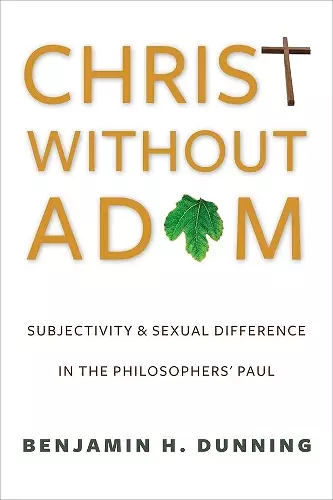Christ Without Adam
Subjectivity and Sexual Difference in the Philosophers' Paul
Format:Hardback
Publisher:Columbia University Press
Published:2nd May '14
Currently unavailable, and unfortunately no date known when it will be back

The apostle Paul deals extensively with gender, embodiment, and desire in his authentic letters, yet many of the contemporary philosophers interested in his work downplay these aspects of his thought. Christ Without Adam is the first book to examine the role of gender and sexuality in the turn to the apostle Paul in recent Continental philosophy. It builds a constructive proposal for embodied Christian theological anthropology in conversation with-and in contrast to-the "Paulinisms" of Stanislas Breton, Alain Badiou, and Slavoj Zizek. Paul's letters bequeathed a crucial anthropological aporia to the history of Christian thought, insofar as the apostle sought to situate embodied human beings typologically with reference to Adam and Christ, but failed to work out the place of sexual difference within this classification. As a result, the space between Adam and Christ has functioned historically as a conceptual and temporal interval in which Christian anthropology poses and re-poses theological dilemmas of embodied difference. This study follows the ways in which the appropriations of Paul by Breton, Badiou, and Zizek have either sidestepped or collapsed this interval, a crucial component in their articulations of a universal Pauline subject. As a result, sexual difference fails to materialize in their readings as a problem with any explicit force. Against these readings, Dunning asserts the importance of the Pauline Adam-Christ typology, not as a straightforward resource but as a witness to a certain necessary failure-the failure of the Christian tradition to resolve embodied difference without remainder. This failure, he argues, is constructive in that it reveals the instability of sexual difference, both masculine and feminine, within an anthropological paradigm that claims to be universal yet is still predicated on male bodies.
Christ Without Adam stands alongside scholarly works by a number of notable scholars of religion who engage efforts by contemporary continental philosophers to draw on the writings of the apostle Paul. It is exceptionally well positioned and appropriately in dialogue with relevant secondary literature, with an original-and important-thesis. -- Jennifer Glancy, LeMoyne College Ben Dunning's Christ Without Adam is a nuanced consideration of the typological framework for a human anthropology that can be derived from the letters of Paul. Noting the enthusiasm with which Paul has been taken up by contemporary theologians, critical theorists, and Continental philosophers, Dunning traces the arguments of three of the most important and influential such thinkers-Stanislas Breton, Alain Badiou, and Slavoj Zizek-on the relations between Adam and Christ in creating this typology. The thinkers Dunning takes up are notoriously complex and not infrequently obscure. He does an excellent job of making their work as clear and accessible as it can possibly be. -- Karmen MacKendrick, LeMoyne College Dunning convinces even those who 'are not in Christ' that the Christian theological enterprise has something to teach us all, that its questions are questions with which we all can identify, that its answers are more than relevant even for nonbelievers, and that the theological reading is more universal, against all expectations, than the postmodern philosophical ones. -- Daniel Boyarin, University of California, Berkeley In Christ Without Adam, Benjamin H. Dunning provides the fullest and most acute critique of 'the philosophers' Paul' thus far. In Romans and First Corinthians, Paul places embodied humanity in a theological space defined by Adam and Christ, who are inseparably linked-a space haunted by the female Eve. By showing how Stanislas Breton, Alain Badiou, and Slavoj Zizek ignore or play down Paul's Adam in their diverse appropriations of Paul's Christ, Dunning exposes the suppression of sexual difference that their versions of Pauline universalism entail. He compellingly argues that Paul's Adam-Christ typology renders queerly unstable gendered identities that some philosophers and theologians claim to be naturally and eschatologically stable. An outstanding contribution not only to Pauline studies and critical theory but also to contemporary Christian theological anthropology. -- David Brakke, Ohio State University Dunning pointedly unpacks theorists' misreadings and partial readings of Paul. He constructively suggests how looking to Paul, while paying closer attention to human embodiment and sexual differentiation, might provide a richer Christian anthropology. A smart and timely book. -- Elizabeth Clark, Duke University In this theoretically and theologically sophisticated book, Dunning argues against the reclamation of the 'universal' attempted in Breton, Badiou, and Zizek, rendered problematic by their erasure of sexual difference in their 'Pauline universal.' Dunning draws on poststructuralist feminist theorists-Judith Butler, Amy Hollywood, Eve Kosofski Sedgwick, and Jacqueline Rose, among others-to argue instead for an unsettled queer and variable sexuality in theological anthropology. Dunning makes a Christian theological argument that Paul's texts, no matter the 'historical Pauline intention,' allow us to imagine open-ended ways of being sexed and gendered, and that such a possibility need not mean falling into uncritical 'identity politics,' so despised especially by Badiou and Zizek. Dunning's proposals are fresh and compelling-and surprisingly generative for constructive theology. -- Dale B. Martin, Yale University Thoughtful... An important book for advanced students of theology and philosophy. CHOICE
ISBN: 9780231167642
Dimensions: unknown
Weight: unknown
176 pages